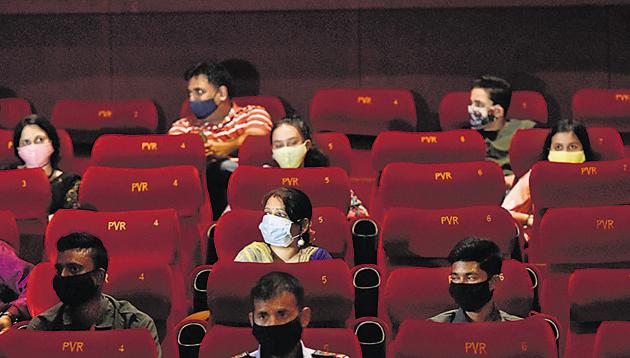-
No exit: It will always be bigger, better at the movies, says Anupama Chopra
Nov 13, 2020 Publication : Hindustan TimesTheatres have reopened across India over the past month. “While numbers in the US and UK have remained subdued in the pandemic, I think it’s going to look very different here at home once new films hit the screens,” says Anupama Chopra. On November 5, movie theatres in Maharashtra reopened. I’m deeply conflicted about going. As I struggle with the abject fear of contracting the virus, or even worse, bringing it home to my elderly parents, I contend also with the desperate desire to be sitting in a large, dark space with strangers. And I wonder, what is the future of the big-screen experience?
Source : bit.ly/2OdvdmILast month, Regal Cinemas, the second-largest exhibitor in the US, temporarily shut all 536 locations in that country. The theatres had reopened only two months earlier. In addition, Regal’s parent company Cineworld has temporarily shut 127 theatres in the UK. In India, it is expected that at least a few hundred single-screen cinema halls will close permanently. They simply don’t have the reserves to ride this out.
Contrast this grim scenario with Japan’s where, according to The Hollywood Reporter, 100% of the nation’s theatres have reopened. THR reported that the anime film Demon Slayer had a record opening of $43 million in mid-October and has since become the fastest film in Japanese movie history to cross the $100 million mark.
Most of China’s 70,000 screens have been open since August. A historical action-drama called The Eight Hundred, also released in that month, has already grossed over $450 million locally and is likely to be the biggest box office hit of 2020 worldwide (the first time a non-English film will occupy that slot).
Paramount Pictures chairman and CEO Jim Gianopulos, delivering a keynote address at the Tokyo International Film Festival’s TIFFCOM market last month, cited the film as evidence that people do want to return to cinema halls.
But by and large, in Hollywood, the mood has been somber. There has been much hand-wringing over the fact that Christopher Nolan’s Tenet, a sci-fi spy thriller that was supposed to resuscitate theatres, made only $55.1 million in the US (partly because theatres were still closed in key markets such as Los Angeles and New York when it came out in August), and only $350 million globally. A spate of doomsday articles have added to the gloom, with dire predictions about the future of theatrical releases.
(Nolan, incidentally, has said he was “thrilled” with the Tenet numbers, all things considered, and added in a recent interview with the Los Angeles Times that the studios were “drawing the wrong conclusions”.)
In India, theatres have reopened in most states. It’s difficult to gauge consumer appetite since capacities are reduced and the films are re-runs. The exception is Bengal, where nine films were released during the Durga Puja festival. Mahendra Soni, co-founder of SVF, one of the largest entertainment companies in the state, was reluctant to share box-office figures with me but said their production, Dracula Sir, clocked almost 60% occupancy in its first week, which gives him confidence that “the audience will surely start coming back to theatres in significant numbers”.
I think he’s right. While the pandemic might alter theatre-going in significant ways in the West, my hunch is that Indians are too movie-crazy to be satisfied with small screens. I remember the pandemonium in May, when the liquor shops reopened after a 40-day lockdown. The internet was flooded with images of long lines and large crowds. I suspect the same will happen with theatres as soon as one of the big-ticket films slated for release — Sooryavanshi, 83 or Master, for instance — finally hits screens.
There will be euphoria, hopefully with masks and social distancing. And I for one can’t wait.




